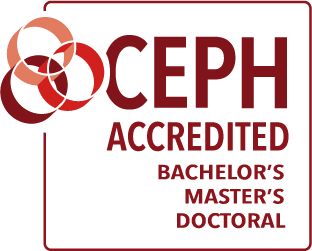MPH students will learn the following competencies in their concentration courses.
Community Health Promotion
- Utilize appropriate social, behavioral, and communication theories, concepts and models in health promotion research and practice.
- Synthesize research findings from the scientific literature to inform health promotion research and practice.
- Apply quantitative and qualitative research methods in health promotion research and practice.
- Design population specific health promotion materials, methods, and evidence-based interventions.
- Advocate for evidence-based policy changes to improve health, reduce health disparities, and eliminate inequities.
Epidemiology
- Utilize data and literature to recognize domestic and global public health problems pertinent to the overall population and to demographic, cultural, or other subgroups of the population.
- Identify determinants or risk factors of human health and disease.
- Select appropriate study design(s) to investigate a public health concern.
- Communicate epidemiologic evidence to lay and scientific audiences.
- Conduct systematic reviews that appropriately summarize epidemiologic literature.
- Implement strategies for minimizing bias in epidemiologic studies.
- Conduct a reproducible data analysis project.
Food Security and Nutrition
- Conduct systematic research literature reviews on the effect of nutrition programs, policies, and practices.
- Apply the concepts and science of food and nutrition in formulating strategies aimed at improving individual and population health outcomes.
- Integrate the social, cultural, historical, political, biological, and environmental factors to plan and evaluate public health nutrition programs.
- Evaluate health and nutritional status of individuals and communities.
- Apply the basic principles of food selection to support healthy dietary practices amongst individuals and population.
Global Health
- Compare the major causes of morbidity and mortality across high-, middle-, and low-income regions.
- Explain the social, economic, and environment determinants of health.
- Apply ethical approaches in global health research and practice.
- Propose sustainable and evidence-based multi-sectoral interventions.
- Apply monitoring and evaluation techniques to global health programs, policies, and/or outcomes.
- Display critical self-reflection, cultural humility, and ongoing learning in global health.
Health Equity and Social Justice
- Critically evaluate the ways in which social and ecological determinants of health contribute to inequities in population health.
- Develop strategies to create systemic change that address poverty, oppression, and inequities.
- Analyze strategies to engage stakeholders and build coalitions and partnerships to influence policy and create change.
- Integrate relevant strategies, methodologies and measures for behavioral health interventions that advance health equity and social justice.
- Evaluate digital innovations and computing techniques to counter the digital divide and improve health equity.
Health Policy
- Apply the effective use of research and various policy analysis tools for supporting policy development, implementation and evaluation.
- Demonstrate ability to write and speak in a clear, logical, persuasive and grammatical manner for policy-related situations and audiences.
- Lead and facilitate constructive interactions with individuals and various policy stakeholder groups to achieve optimum decision-making in policy advocacy, development, implementation and analysis.
- Critically evaluate policy issues, ideas, events and process in advance of policy development and decision making.
- Select, perform, and interpret appropriate statistical analyses.
Public Health Communication
[Note: this program is not enrolling new students at this time.]
- Understand the strategic roles of communication and marketing in public health practice.
- Understand major health communication theories, and how they apply to public health practice.
- Demonstrate the ability to plan evidence-based and culturally sensitive public health communication programs.
- Demonstrate the ability to implement evidence-based and culturally sensitive public health communication programs using a variety of communication channels.
- Demonstrate the ability to evaluate evidence-based and culturally sensitive public health communication programs.
- Ability to conduct research to guide the development, implementation, evaluation, and dissemination of public health communication programs.
Public Health Practice
- Coordinate with emergency management agencies and other stakeholders to prepare for and respond to public health emergencies.
- Explore legal and regulatory actions to improve and protect the environment and the public’s health.
- Synthesize evidence from the scientific literature to inform public health policy, research, and practice.
- Apply principles of effective project management in public health practice.
- Analyze the social and ecological determinants of health disparities, inequities, and inequalities.
- Recommend evidence-informed policies and programs to address current or emerging public health problems among specific populations.

